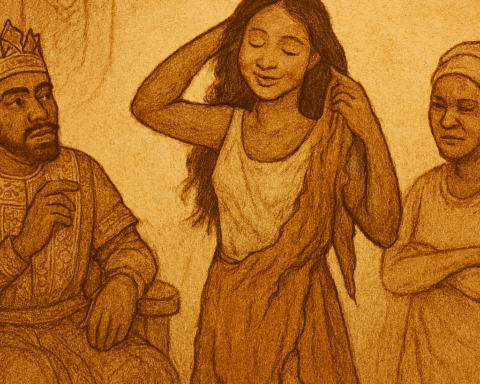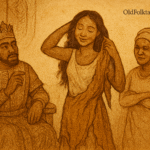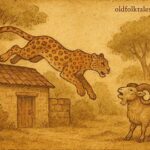Long ago, in the golden plains where the baobab trees cast long shadows across the dry earth, the animals of the savannah lived under a delicate balance. Each animal knew its place, and there was peace—most of the time. But one creature was always scheming: the hyena.
This particular hyena was named Gbaru, and he was known for two things: his deep, scratchy laugh that echoed across the plains, and his insatiable hunger.
Gbaru was never satisfied. Even when he had more than enough to eat, he wanted what others had too. The other animals had learned to be cautious around him, for where Gbaru walked, mischief followed.
Now, in this land, there was an unspoken agreement among the animals: when food was scarce, they would share. In the dry season, they held gatherings under the large acacia tree, where everyone brought what they could and meals were shared equally. This kept peace, especially when hunger made tempers short.
But Gbaru didn’t like sharing.
One season, when the heat was high and the rivers shrank to dusty beds, Gbaru devised a plan. He had heard of a cave in the distant hills where wild yams grew deep underground, untouched by drought. No animal had ever bothered with it—too far, too hidden. But Gbaru found it and claimed it for himself.
Instead of telling the others, he pretended to suffer like the rest.
“Oh, my belly,” he moaned at the gathering. “I am wasting away! Look how thin I am!”
His ribs poked out, not from starvation, but from tightening his body before he appeared. At night, however, Gbaru would sneak away to his secret yam cave and feast until his belly bulged like a drum.
He began to grow strong while the others grew weak.
But Gbaru wasn’t content with just hoarding. He wanted more—attention, praise, and the last laugh.
So he told a lie.
“There is a magical spirit,” he announced one day, “who appears only to the pure-hearted. Last night, I saw her. She fed me honeyed roots and sweet berries. That is why I have strength.”
The other animals were amazed.
“Where does this spirit appear?” asked the tortoise.
“I cannot say,” Gbaru said with a fake tear. “She appears only in dreams… and to those she chooses.”
The animals believed him, for spirits were known to walk the land in times of need.
The lion fasted to purify himself. The antelope bathed in moonlight. The baboon sang old songs. But none saw the spirit—because she didn’t exist.
Still, Gbaru grew fatter.
But not all animals were fooled.
The hare, clever and small, watched Gbaru closely. She noticed his paw prints led away at night and returned before dawn. She sniffed the wind and smelled roasted yam on his fur.
One night, the hare followed him—quiet as shadow—into the hills.
There she saw it: a wide cave, filled with yams, the walls blackened by cooking fires. And there was Gbaru, stuffing his face.
The hare ran back and told the others.
In the morning, the tortoise led a council. “We do not punish without proof,” he said. “But this cannot go on.”
They devised a plan.
The next day, they approached Gbaru. “Brother Hyena,” the lion said kindly, “we believe your words. But we ask: will you pray for us tonight? Call upon the spirit to help us?”
Gbaru, caught between his lie and his pride, nodded. “Of course.”
That night, while Gbaru snuck away, the hare and monkey followed. They hid near the cave and waited until he was deep inside, singing fake prayers between mouthfuls of yam.
Then —whoosh— they lit a fire at the cave mouth.
Not to burn him—but to trap him.
Smoke filled the cave.
“Help!” Gbaru cried, coughing. “I’m the chosen one!”
The others arrived, pulled him out, and saw the truth: his secret stash, the roasted yams, the fat belly.
The lion roared. “You tricked us. While we suffered, you gorged in secret.”
Ashamed, Gbaru whimpered. “I only wanted to eat…”
“And you could have,” said the tortoise. “If you had shared.”
From that day, Gbaru was banned from the gatherings. He had to hunt alone, and no animal trusted him again.
And that is why, to this day, hyenas laugh when they are alone. It is not joy—but the echo of old tricks.
✧ Commentary
This tale reflects a common thread in West African folklore: a trickster character whose greed leads to their downfall. The hyena represents selfishness and dishonesty, while the other animals embody community, cooperation, and justice. The story warns against deception and highlights the value of sharing, especially during hardship. It’s also a light satire on those who manipulate tradition or spiritual beliefs for personal gain.
✧ Moral
Greed blinds the greedy. When you lie and hoard, you lose more than you gain. True strength is found in honesty and sharing.
✧ Questions & Answers
1. Q: What did the hyena do that caused trouble? A: He discovered a secret food source and lied to the other animals while pretending to suffer.
2. Q: What lie did the hyena tell? A: That a magical spirit was feeding him because of his purity.
3. Q: Who exposed the hyena’s trick? A: The clever hare, who followed him and saw his secret stash.
4. Q: How did the other animals respond to the hyena’s lie? A: They trapped him with smoke and revealed his secret to all.
5. Q: What lesson does this story teach? A: That greed and dishonesty break trust, and even clever lies eventually collapse.





